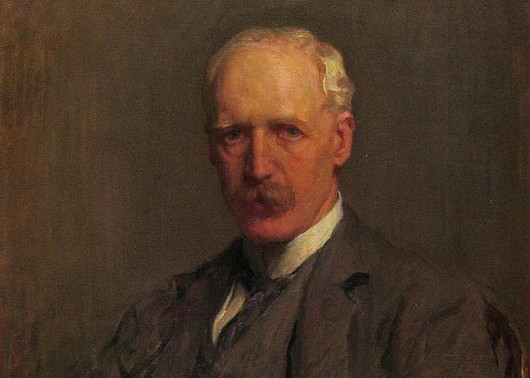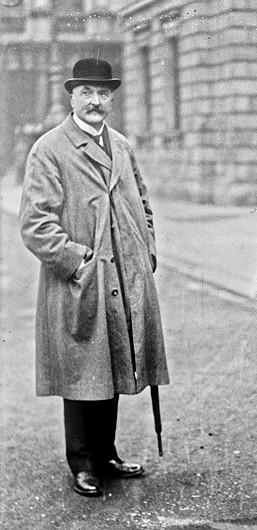
About Andrew Cusack
 Writer, web designer, etc.; born in New York; educated in Argentina, Scotland, and South Africa; now based in London.
Writer, web designer, etc.; born in New York; educated in Argentina, Scotland, and South Africa; now based in London. read more
News
Blogs
Reviews & Periodicals
Arts & Design
World
France
Mitteleuropa
Knickerbockers
Argentina
The Levant
Africa
Cape of Good Hope
Netherlands
Scandinavia
Québec
India
Muscovy
Germany
Academica
Colonel Moore

Senator Colonel Maurice George Moore, Companion of the Order of the Bath, is an understudied figure from that remarkable period of rapid transformation in Ireland’s political history. While certainly far from typical, Colonel Moore’s experience reflects the changing age rather well.
He was born in 1854 at Moore Hall in Co. Mayo where his family — English settlers who had converted to Catholicism — made their home. His father, George Henry Moore, was known as a kind landowner, and when his horse Coranna won the Chester Gold Cup during the height of the Great Famine, the £17,000 winnings were spent on giving each tenant a cow and importing thousands of tons of grain to relieve their hunger. During this dark period, not a single family was evicted from the Moore lands for non-payment of rent, and not a single Moore tenant died of hunger.
Younger son Maurice was educated locally before heading off to Sandhurst and was commissioned a lieutenant in the Connaught Rangers in 1874. The Ninth Xhosa War brought him to South Africa for the first time, also seeing action during the Anglo-Zulu War not much later. Promoted to captain in 1882 and major in 1893 it was the great Boer War (1899–1902) which transformed Moore’s entire world.
As a field commander Moore was highly regarded and proved himself capable at the Battles of Ladysmith, Colenso, Spioen Kop, and Vaal Krantz. His conduct in combat notwithstanding, Moore was appalled by the atrocities committed by his own side against the Boer civilian population — women and children herded into concentration camps where many starved to death while, just beyond the barbed-wire fences, British troops were exceptionally well provisioned. One wonders what effect the stories of the Great Hunger that took place just a few years before his own birth may have had on witnessing these horrible and frighteningly avoidable horrors.
With the Boers finally defeated, Moore ended up a colonel and was made a Companion of the Order of the Bath in honour of his achievements. In South Africa he became fluent in the Irish language having started to learn it from soldiers under his command. Back home in Ireland, Col Moore became active in promoting the study of Irish language and history, whether at evening schools on his family’s estates or in joining Conradh na Gaeilge and supporting compulsory Irish at the National University.
When Óglaigh na hÉireann — the Irish Volunteers (now Ireland’s defence force) — was founded in 1913 his military experience was judged useful and he was appointed to its provisional committee. He opposed Redmond’s takeover bid a year later but nonetheless followed him into the National Volunteers when the split did occur, the Redmondites putting themselves at the disposal of the British forces during the Great War. Colonel Moore’s final break with the constitutional nationalist leader came after the Easter Rising, and he joined Sinn Féin the following year. In 1918 his son Ulick was killed in action during the German’s spring offensive.
Given  Col. Moore’s long experience in South Africa, Dail Éireann appointed him the secret Irish envoy to that country. With the creation of Seanad Éireann in 1922, Col. Moore was appointed a senator and began his legislative career which continued the entirety of the Free State Senate’s existence.
Col. Moore’s long experience in South Africa, Dail Éireann appointed him the secret Irish envoy to that country. With the creation of Seanad Éireann in 1922, Col. Moore was appointed a senator and began his legislative career which continued the entirety of the Free State Senate’s existence.
Starting out in Cosgrave’s ruling Cumann na nGaedheal party, Senator Moore quickly began to oppose the government policy. The Boundary Agreement late in 1925 provoked his defection to the new Clann Éireann (or People’s Party) when it was founded early on in 1926. Just two months later, in March 1926, de Valera founded Fianna Fáil which took on what little momentum Clann Éireann had. Once Dev’s efforts proved their worth at the ballot box in 1928, with voters electing eight Fianna Fáil senators, Col Moore sat with the party in Leinster House.
In 1932, the voters put Fianna Fáil in power for the first of many times and de Valera began his reshaping of the Irish state, culminating in the 1937 Constitution of Ireland that has stood the test of time. Significantly, Ireland is the only successor state to have emerged from the First World War to have preserved its constitutional democracy, and much of this is due to Dev’s instinctive conservative republicanism. When the Constitution came into effect in 1937, An Taoiseach appointed Col Moore to the newly constituted Seanad, and he continued to serve as a Senator up until his death in 1939.
Search
Instagram: @andcusack
Click here for my Instagram photos.Most Recent Posts
- Letters Patent May 8, 2024
- Bicycle Rack April 29, 2024
- Burns Tower April 19, 2024
- Patrick in Parliament March 18, 2024
- Articles of Note: 13 March 2024 March 13, 2024
Most Recent Comments
Book Wishlist
Monthly Archives
Categories




Hi,
I think that full length photo is Thomas Westropp Bennett, and Moore is the chap beside him in the original photo. Looks like the publishers got the caption in the wrong order.
Regards,
Sheila
https://openlibrary.org/authors/OL5446073A/Thomas_William_Westropp_Bennett